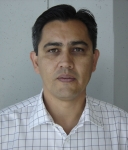|
|
KEYNOTE SPEAKERS
Knowledge management as a sustainable, multidisciplinary and global growth engine
Dr. Fernando Machuca - Genioux.com Corporation – United States
 A
modern knowledge management system supports genioux.com, a virtual free
access community, making history by giving online socialization a
profound sense of growth that is sustainable, multidisciplinary and
global, in addition to being socially, intellectually, economically,
culturally and environmentally integrated. genioux.com fosters
large-scale open global creativity, founded on knowledge and integrated,
multidisciplinary avant-garde tools that produce ten levels of growth
ranging from those associated with the individual, family, group,
organization, company and community to local, national, regional and
world development.
The knowledge management system makes it possible to offer tools to:
- Stimulate meaningful socialization as open communication directed
to growth through the full expression of personal and organizational
voice.
- Give maximum empowerment to each member, as the unique leader
(g-leader) that each person is, so that s/he exercises freely, and with
the greatest possible effectiveness, this personal leadership in
complete synergy with organizational leadership, as an integral person
(body, mind, heart, spirit).
- Increase the productivity, competitiveness and strategic planning
of g-leaders, while simultaneously improving in a significant way their
capacity for innovation and execution in businesses and organizations of
all types and sizes.
- Expedite the launching, growth and development of businesses.
- Foster and facilitate commercial transactions.
- Participate in the creation of knowledge and information, in accordance with the principles of knowledge management.
- Search structured knowledge and information.
- Personalize profile management, enabling effective classification of contacts into different friendship circles.
 Quantum Information Circuits Dr. Miroslav Svitek Quantum Information Circuits Dr. Miroslav Svitek - CVUT in Prague, República Checa Presentation
summarizes the current results in the area of information physics that
is a new progressively developing field trying to introduce basic
information flow into physics. New parameters like wave information
flow, waveinformation/knowledge content or wave information impedance
will be first defined and introduced and then represented by wave
probabilistic functions. Next, relations between newly defined
parameters are given to compute information power or to build wave
information circuits covering feedbacks, etc.The new challenges of learning environments for Y generationDr. Sérgio Crespo - UNISINOS, Brazil Internet,
Twitter, Wifi, Orkut, Facebook, YouTube, digg, Squidoo, Flickr,
Pandora, MSN, among others, are tools on the Internet and widely used by
young people of Y generation. They are young people that consume a
large amount of information, always use parallel processing, become more
collaborative, communicative, creative, dispersive some times, and
selective. They are kids between 0 and 12 years.We,
on the other side, are the creators of these tools, but with sequential
processing. The fundamental question is how to design educational
environments using these new attributes of Y generation and how to
combine these resources to grow the full potential learning of this Y
generation, these are hard challenges to the Native digital people.
This talk will discuss about these new obstacles for the development of
new educational environments for Y generation.Integrating Multicultural Aspects in HCI-CurriculaDr. César Alberto Collazos - Universidad del Cauca, Colombia Internet,
Twitter, Wifi, Orkut, Facebook, YouTube, digg, Squidoo, Flickr,
Pandora, MSN, among others, are tools on the Internet and widely used by
young people of Y generation. They are young people that consume a
large amount of information, always use parallel processing, become more
collaborative, communicative, creative, dispersive some times, and
selective. They are kids between 0 and 12 years.We,
on the other side, are the creators of these tools, but with sequential
processing. The fundamental question is how to design educational
environments using these new attributes of Y generation and how to
combine these resources to grow the full potential learning of this Y
generation, these are hard challenges to the Native digital people.
This talk will discuss about these new obstacles for the development of
new educational environments for Y generation.Integrating Multicultural Aspects in HCI-CurriculaDr. César Alberto Collazos - Universidad del Cauca, Colombia In
the developing of any kind of interactive and information applications,
multicultural aspects, usually, have not been taked into account.
Therefore, people need to adapt to the interfaces instead the opposite,
interfaces adapting themselves to the user characteristics. Designing
products for international users all above the world will be one of the
main goals for future marketing strategies. HCI (Human-Computer
Interaction) area has experimented a growth that has occurred as a
result of the generalization of computer use and of problems which
originate from use by people who are not specifically trained in these
appliances. Despite this growth, multicultural aspects in many cases are
not included in the HCI Curricula. In recent years, diverse symptoms
have expounded that the Ibero-American market is growing very fast to
incorporate professionals with HCI backgrounds and solid knowledge about
User Centre Design methods. Indeed, these kinds of professionals are
currently required when developing or localizing interactive systems in
this particular scenario. In this talk, will be described the experience
of starting the first HCI master in Spanish language for the wide
Spanish speaking context held in the University of Lleida (Catalonia,
Spain), where it has been included specific courses including the
multicultural aspects. They will orient the students to have in mind
cross-cultural factors when developing international interfaces. In many
cases, even it implies adapting evaluation techniques such as usability
heuristics traditionally used in HCI courses. In
the developing of any kind of interactive and information applications,
multicultural aspects, usually, have not been taked into account.
Therefore, people need to adapt to the interfaces instead the opposite,
interfaces adapting themselves to the user characteristics. Designing
products for international users all above the world will be one of the
main goals for future marketing strategies. HCI (Human-Computer
Interaction) area has experimented a growth that has occurred as a
result of the generalization of computer use and of problems which
originate from use by people who are not specifically trained in these
appliances. Despite this growth, multicultural aspects in many cases are
not included in the HCI Curricula. In recent years, diverse symptoms
have expounded that the Ibero-American market is growing very fast to
incorporate professionals with HCI backgrounds and solid knowledge about
User Centre Design methods. Indeed, these kinds of professionals are
currently required when developing or localizing interactive systems in
this particular scenario. In this talk, will be described the experience
of starting the first HCI master in Spanish language for the wide
Spanish speaking context held in the University of Lleida (Catalonia,
Spain), where it has been included specific courses including the
multicultural aspects. They will orient the students to have in mind
cross-cultural factors when developing international interfaces. In many
cases, even it implies adapting evaluation techniques such as usability
heuristics traditionally used in HCI courses.
Integral optimization of operations in oil transportation
Dr. Juan Carlos García Díaz - ECOPETROL, Colombia Optimization
of transportation in ECOPETROL S.A. is focused on management of every
optimization activity performed throughout the overall transportation
process; it considers – among others – the following functions: integral
optimization of the transportation process, optimization of TI and
control infrastructure required to support the other processes, and
service optimization (includes agreements with customers and suppliers
of both internal and external services).The
INTEGRAL OPTIMIZATION OF TRANSPORTATION function consolidates the
optimization actions considered from the planning process to the real
operation, and includes the following levels: Optimization
of transportation in ECOPETROL S.A. is focused on management of every
optimization activity performed throughout the overall transportation
process; it considers – among others – the following functions: integral
optimization of the transportation process, optimization of TI and
control infrastructure required to support the other processes, and
service optimization (includes agreements with customers and suppliers
of both internal and external services).The
INTEGRAL OPTIMIZATION OF TRANSPORTATION function consolidates the
optimization actions considered from the planning process to the real
operation, and includes the following levels:- Optimization
of transportation modes: deals with selecting the most convenient mode
(pipeline, truck, barge) in order to satisfy transportation
requirements. It considers application of linear optimizers to determine
the transportation monthly plan which consists of gross volumes of
products to transport in each pipeline system, truck fleet or barge
fleet.
- Scheduling
optimization: after selecting transportation modes, this level
considers different options for scheduling transportation and selects
the best option within the time window established for service. It
considers application of simplified hydraulic simulators and linear
optimizers to determine the daily batch schedule – for pipelines, and
the truck and barge schedule, which optimize specified criteria.
- Energy
optimization: deals with calculating setpoints for operational
parameters, so that the maximum energetic efficiency in the
transportation system, can be reached. It involves the use of rigorous
hydraulic dynamic simulators as well as nonlinear optimizers to find the
minimum cost operating conditions.
- Optimization
of operation: corresponds to optimizing actions during the execution of
operation itself, oriented towards fulfilling the daily optimized
schedules defined the three previous levels; it can use hydraulic
simulators as well as knowledge based systems to support pipeline
operators in specific conditions which cause deviations from the optimal
schedules.
The
purpose of this talk is to show the mathematical models – based on
software tools – which are being developed in ECOPETROL S.A. in order to
support the above optimization levels.Data Mining Algorithms and Implementation of Efficient Computing Tools In Petroleum and Health Dr. Pablo Guillén - Universidad de Los Andes, Venezuela
 Data
mining is a process of inductively analyzing data to find interesting
patterns and previously unknown relationships in the data. These
relationships can be translated into statistical index that are used to
predict future events or to provide knowledge about interrelationships
among data. Data mining in applications such as seismic, geology,
bioinformatics, biomedical signals, oil and gas production, are
well-known problems we are confronted with almost every day by the
media. This talk begins with an overview of different data mining
algorithms. Next,Mathematically accurate model are defined as a basis
for simulating the particular application. Finally, it is shown
simulations and implementations applied in data from petroleum and
health. Data
mining is a process of inductively analyzing data to find interesting
patterns and previously unknown relationships in the data. These
relationships can be translated into statistical index that are used to
predict future events or to provide knowledge about interrelationships
among data. Data mining in applications such as seismic, geology,
bioinformatics, biomedical signals, oil and gas production, are
well-known problems we are confronted with almost every day by the
media. This talk begins with an overview of different data mining
algorithms. Next,Mathematically accurate model are defined as a basis
for simulating the particular application. Finally, it is shown
simulations and implementations applied in data from petroleum and
health.
|
|
|
|
|